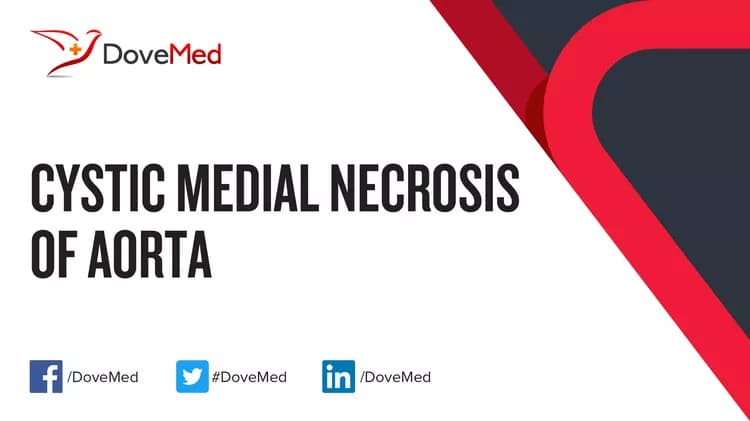What are the other Names for this Condition? (Also known as/Synonyms)
- Annuloaortic Ectasia
- Erdheim Disease
- Familial Aortic Dissection
What is Cystic Medial Necrosis of Aorta? (Definition/Background Information)
- Cystic Medial Necrosis of Aorta, or Familial Aortic Dissection, is the term used to describe rupture of the aortic wall at the level of the media, resulting in the formation of a false channel and deviation of part of the aortic flux
- Familial predisposition to thoracic aortic aneurysms and type A dissections (concerning the ascending aorta and/or the aortic arch) has been demonstrated in around 19% of patients presenting with thoracic aortic dissections and several loci have been identified so far (16p12.2-p13.13, 3p24-25)
- This predisposition is transmitted in an autosomal dominant manner
(Source: Familial aortic dissection; Orphanet, National Institute of Health and Medical Research (INSERM), Paris.)
Who gets Cystic Medial Necrosis of Aorta? (Age and Sex Distribution)
- Cystic Medial Necrosis of Aorta is a rare disorder of the heart. The presentation of symptoms may occur at any age
- Both males and females may be affected
- Worldwide, individuals of all racial and ethnic groups may be affected
What are the Risk Factors for Cystic Medial Necrosis of Aorta? (Predisposing Factors)
- A positive family history of thoracic aneurysms and type A dissections may be important risk factors for Cystic Medial Necrosis of Aorta
It is important to note that having a risk factor does not mean that one will get the condition. A risk factor increases one’s chances of getting a condition compared to an individual without the risk factors. Some risk factors are more important than others.
Also, not having a risk factor does not mean that an individual will not get the condition. It is always important to discuss the effect of risk factors with your healthcare provider.
What are the Causes of Cystic Medial Necrosis of Aorta? (Etiology)
- The genetic cause of Cystic Medial Necrosis of Aorta is not known at the present time
- The genetic predisposition to this condition is transmitted in an autosomal dominant manner
Autosomal dominant inheritance: Autosomal dominant conditions are traits or disorders that are present when only one copy of the mutation is inherited on a non-sex chromosome. In these types of conditions, the individual has one normal copy and one mutant copy of the gene. The abnormal gene dominates, masking the effects of the correctly function gene. If an individual has an autosomal dominant condition, the chance of passing the abnormal gene on to their offspring is 50%. Children, who do not inherit the abnormal gene, will not develop the condition or pass it on to their offspring.
What are the Signs and Symptoms of Cystic Medial Necrosis of Aorta?
The signs and symptoms of Cystic Medial Necrosis of Aorta may include:
Very frequently present symptoms in 80-99% of the cases include cystic medial necrosis of the aorta.
Frequently present symptoms in 30-79% of the cases include:
- Aortic regurgitation
- Ascending aortic dissection
- Cardiomegaly
- Chest pain
- Coronary artery disease
- Descending aortic dissection
- Dilatation of ascending aorta
- Dilatation of the descending aortic
- Exertional dyspnea
- Left ventricular failure
- Paroxysmal dyspnea
- Patent ductus arteriosus
Occasionally present symptoms in 5-29% of the cases:
- Carotid artery dilatation
- Cutis marmorata
- Dilatation of the cerebral artery
- Peripheral arterial stenosis
- Stroke
(Source: Cystic Medial Necrosis of Aorta; Genetic and Rare Diseases Information Center (GARD) of National Center for Advancing Translational Sciences (NCATS), USA.)
How is Cystic Medial Necrosis of Aorta Diagnosed?
Cystic Medial Necrosis of Aorta is diagnosed on the basis of the following information:
- Complete physical examination
- Thorough medical history evaluation
- Assessment of signs and symptoms
- Laboratory tests
- Imaging studies, including echocardiography
- Biopsy studies, if necessary
Many clinical conditions may have similar signs and symptoms. Your healthcare provider may perform additional tests to rule out other clinical conditions to arrive at a definitive diagnosis.
What are the possible Complications of Cystic Medial Necrosis of Aorta?
The complications of Cystic Medial Necrosis of Aorta may include:
- Abnormal heart functions
- Endocarditis
- Heart attack
- Permanent neurologic damage due to stroke
Complications may occur with or without treatment, and in some cases, due to treatment also.
How is Cystic Medial Necrosis of Aorta Treated?
There is no cure for Cystic Medial Necrosis of Aorta, and treatment is usually given to manage the signs and symptoms and any complication that develops. Surgical repair of the affected tissue may be necessary.
How can Cystic Medial Necrosis of Aorta be Prevented?
Currently, Cystic Medial Necrosis of Aorta may not be preventable, since the exact cause of this condition is not known
- If there is a family history of the condition, then genetic counseling will help assess risks, before planning for a child
- Active research is currently being performed to explore the possibilities for treatment and prevention of inherited and acquired genetic disorders
Regular medical screening at periodic intervals with tests and physical examinations are recommended.
What is the Prognosis of Cystic Medial Necrosis of Aorta? (Outcomes/Resolutions)
- The prognosis of Cystic Medial Necrosis of Aorta is dependent upon the severity of the signs and symptoms and associated complications, if any
- Individuals with mild conditions have better prognosis than those with severe symptoms and complications
- Typically, the prognosis may be assessed on a case-by-case basis
Additional and Relevant Useful Information for Cystic Medial Necrosis of Aorta:
The following DoveMed website link is a useful resource for additional information:
Related Articles
Test Your Knowledge
Asked by users
Related Centers
Related Specialties
Related Physicians
Related Procedures
Related Resources
Join DoveHubs
and connect with fellow professionals


0 Comments
Please log in to post a comment.